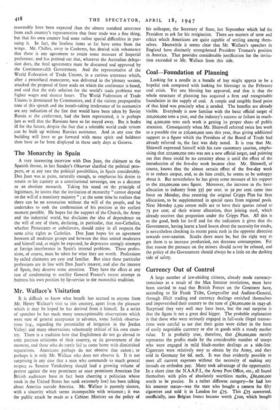The Monarchy in Spain
A very interesting interview with Don Juan, the claimant to the Spanish throne, in last Sunday's Observer clarified the political pros- pects, or at any rate the political possibilities, in Spain considerably. Don Juan was at pains, naturally enough, to emphasise his desire to return to his cquntry as a constitutional sovereign, not as a dictator or an absolute monarch. Taking his stand on the principle of legitimacy, he insists that the institution of monarchy " cannot depend on the will of a transitory majority " ; at the same time he realises that there can be no restoration without the will of the people, and he undertakes to seek the confirmation of his position at the earliest moment possible. He hopes for the support of the Church, the Army and the industrial world, but disclaims the idea of dependence on the will of any of them, declaring, in particular, that non-Catholics, whether Protestants or unbelievers, should enjoy in all respects the same civic rights as Catholics. Don Juan hopes for an agreement between all moderate groups and between the thus united moderates and himself and, as might be expected, he deprecates strongly attempts at foreign interference in Spain's internal problems. These profes- sions, of course, must be taken for what they are worth. Professions by exiled claimants are easy and familiar. But since these particular professions are in line with Don Juan's interest, and also the interest of Spain, they deserve some attention. They have the effect at any rate of condemning to sterility General Franco's recent attempt to buttress his own position by lip-service to the monarchic tradition.


































 Previous page
Previous page